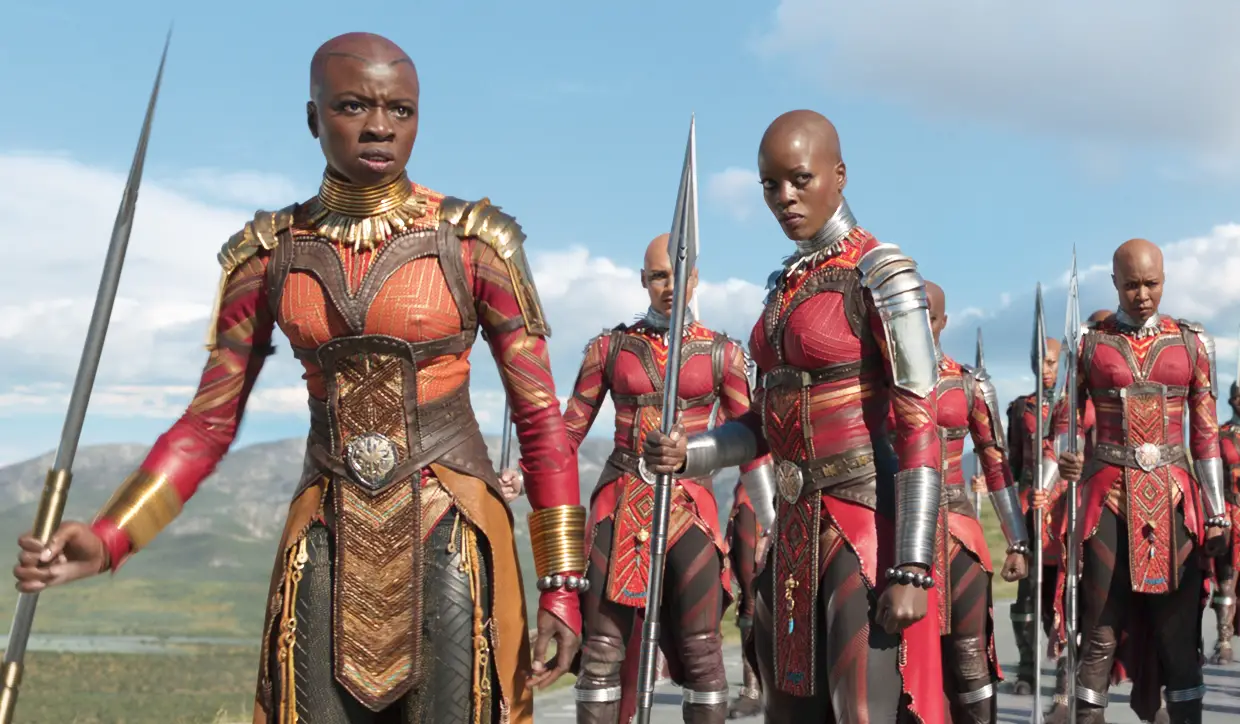By Nola Haynes
(AllHipHop Opinion) Black Panther is the crown jewel in recent Black cinema because it is a major, motion picture attached to the ultra-successful Marvel brand. Black Panther the superhero or T’Challa the king, is not merely the Black, pseudo-superhero sidekick, good for a one-liner every-so-often. Black Panther reminds audiences that Black people did not just pop up along Atlantic coastlines forcefully displaced and enslaved. Rather, it reclaims Africa’s mantle as the cradle of civilization with all the swag, attitude and rhythm of the diaspora.
Until Valkyrie in Thor: Ragnarok, women of color were completely absent within the MCU’s vast world of humans, superhumans aliens and villains (Storm and Misty Knight are separate issues, but you get the picture). Then it happened, the meme heard around all of Blackdom, Lupita in that yellow dress and two bomb Black statuesque women flanking T’Challa, ripped to shreds, wearing gold chokers to die for. We had little context, we just knew it was new, bold and snatched to the heavens. Collectively we asked, who are these superwomen and can I rock a bald head too? The answer is they are the Dora Milaje – pronounced “dora-meh-LAH-shay.” This group of Wakandan female warriors are elite body guards to king T’Challa (first appearance Black Panther Vol 3 #1, November 1998). Historically, the Dora Milaje were women groomed to marry the king of Wakanda. Eventually their role expanded to warriors loyal to Wakanda, but chiefly to the king. Doras only communicate with each other and the king in the Hausa dialect, which is everything.
While Black Panther is not the first Black superhero to break boundaries, let’s give that to Wesley Snipes in the Blade trilogy (and tried to get T’Challa in the movies in the early 90’s); Black Panther is the first stand-alone film within the wildly successful Marvel Universe to prominently feature and glamorize women of color. This reality has long since plagued feature films with Black, male leads. Oftentimes, Black men are partnered with non-Black women, which automatically tells us, this film is not for you or about you. The Dora Milaje elevate the Black, female beauty aesthetic beyond niche to mainstream. This is an important social, cultural and political moment for Black women. We are celebrating #blackgirlmagic, #blackgirlsrock and singing the lyrics to Solange’s “Don’t Touch My Hair” like an old Negro spiritual. This awakening around the Black, female aesthetic is not new, but it’s here with a vengeance.
To the critics that remind us that Wakanda is a fictitious world, therefore Black women can rock bantu knots and bald heads without judgement. This is where I remind folks that representation matters, Hollywood box office receipts matter, therefore Black dollars matter. Black Panther has a forward glance, an Afrofuturism appeal that evolves and disrupts the status quo. I won’t even entertain the “it’s too Black” nonsense. Turn up Solange, Kendrick and SZA, grab your crew and get ready for all this Wakandan #blackgirlmagic.
[ALSO READ: Before Black Panther: 15 Things To Know About The Super Hero King ]
Image: Marvel
